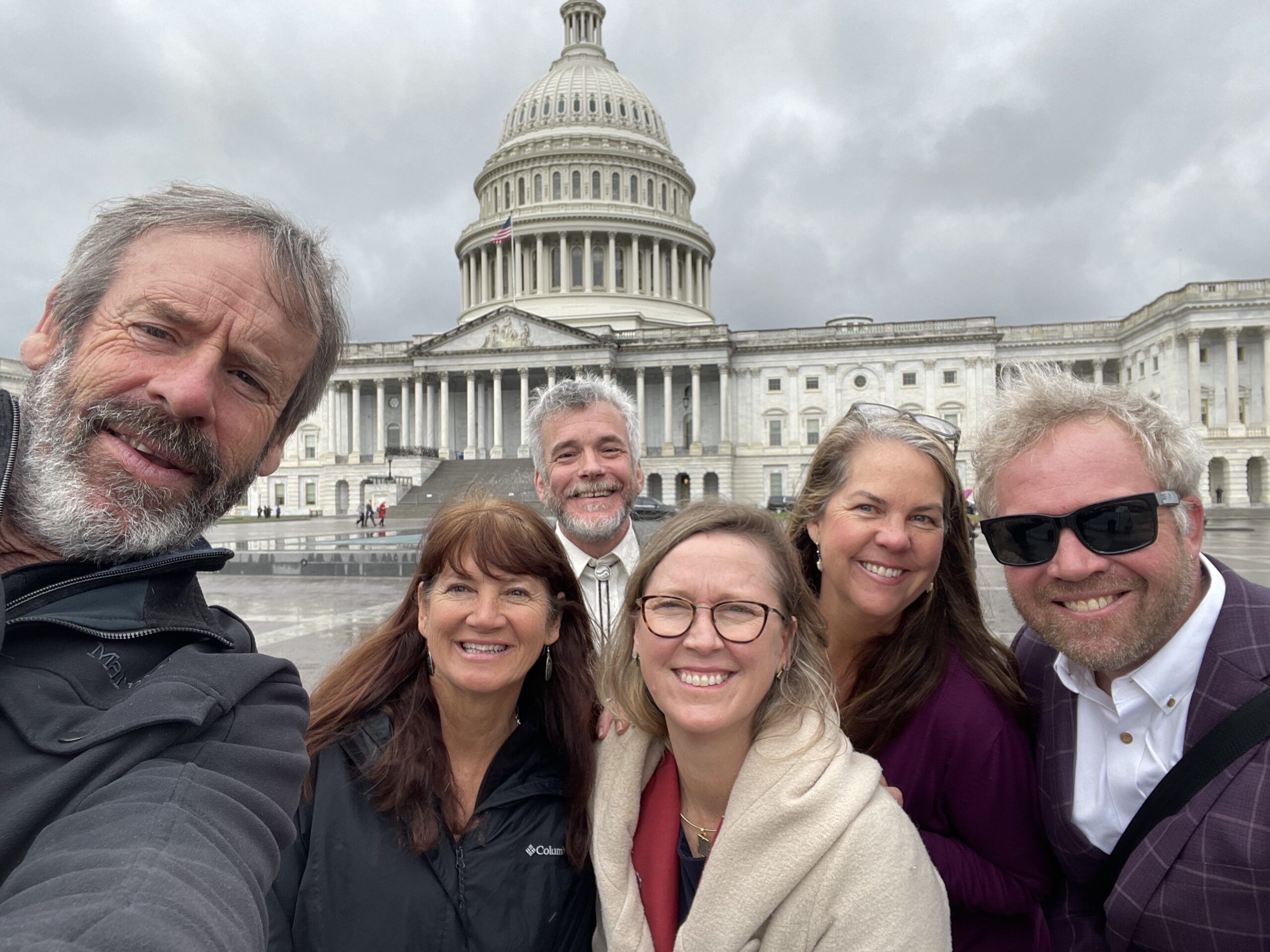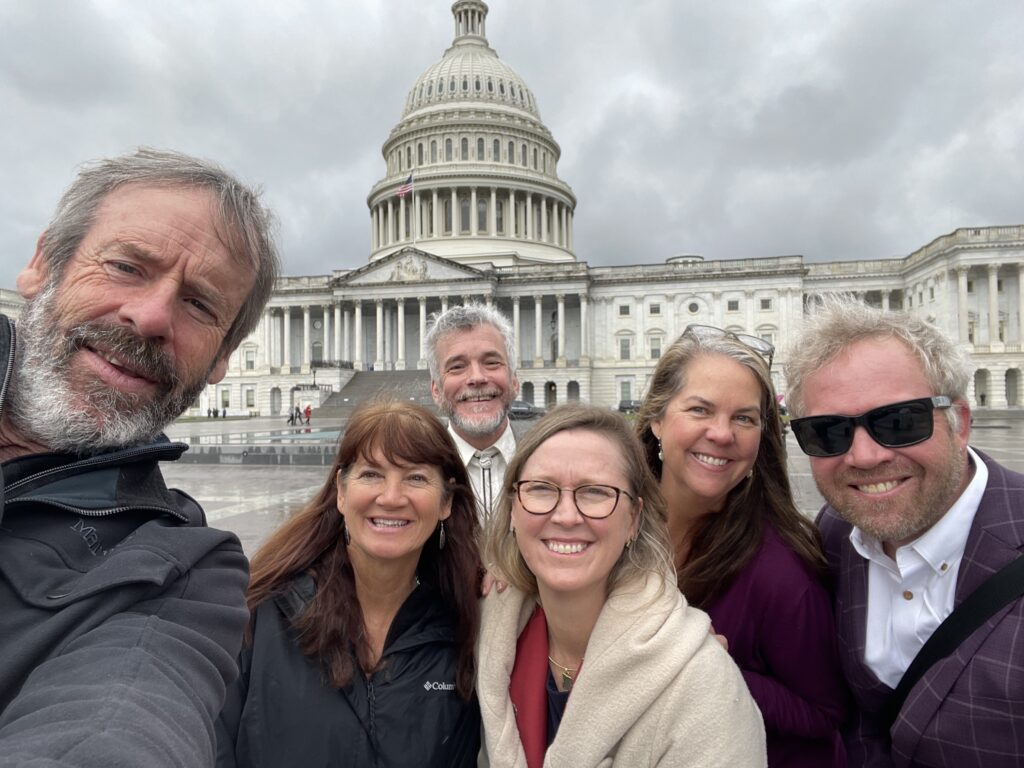
Community leaders met with senior-level federal officials

Representatives from western Colorado’s North Fork Valley are back home after another successful trip to Washington DC. Each year the Colorado Farm & Food Alliance, Western Slope Conservation Center and the Valley Organic Growers Association sends a delegation to the nation’s capital to discuss issues impacting the Western Slope.
“Over the last decade this annual trip of leaders from the North Fork area to Washington DC has had a real impact.” said Hannah Stevens, executive director of the Western Slope Conservation Center. “This was my first time going and I was struck how people were well aware of the North Fork and wanted to learn from our perspectives. We met with leaders and officials who needed and wanted to hear what we had to say.”
The group met with four federal agencies, including national leadership from the U.S. Bureau of Land Management, senior climate and renewable staff at the U.S. Department of Agriculture, public lands and energy staff with the White House Council of Environmental Quality, and the U.S. Bureau of Reclamation. Topics included the importance of protecting public lands and watersheds, how to advance rural renewables in a way that benefits local communities, and advancing regenerative “climate-smart” agriculture in a manner that supports small, family farms and ranches. And although this year the focus was on agency meetings, as Congress remains gridlocked, the group also met with Senator Michael Bennet and his staff along with Senator Hickenlooper’s staff.
The members of the group agree that the meetings were all productive and insightful, and that the officials they met with were interested in learning how federal programs they oversee can impact specific places like the North Fork Valley. But the impact of this trip goes deeper than just the quality of these meetings.
“For over a decade community leaders from Delta County have left their fields, homes and offices to travel across the country, to bring their concerns and ideas to policymakers,” said Pete Kolbenschlag with the Colorado Farm & Food Alliance, who has helped lead the trip over the years. “This gets noticed. It impacts how people In DC look at their work and it helps make sure that our rural-rooted input can make a difference back here in Colorado.”
The origins of this trip lie in efforts to defend against ill-advised oil and gas development on the public lands in and around the area’s water sources. Now as the BLM works to finalize several land use plans and other initiatives in the region, these issues have very much returned to high on the group’s agenda. The message for the agency and elected leaders was direct: the valley’s delegation is eager to see real progress on public land protections in western Colorado.
“As recent polls have shown again, western Colorado communities depend upon and cherish our public lands and the many benefits they provide,” said Cody Perry, Advocacy Manager with the Western Slope Conservation Center. “But healthy watersheds and healthy wildlife populations depend on a landscape-level conservation vision. We were in DC to speak to this need, and the opportunity right now, to provide this type of protection.”
The group was there to support several current proposals to protect the health of the landscape, the resilience of watersheds, and the value of wildlife habitat and of ecosystem connectivity. The delegation spoke to the BLM and the White House CEQ on the need for watershed-scale protection, expanding the vision of the Thompson Divide mineral withdrawal, and of their deep engagement, for more than a decade, in support of similar protections for the North Fork watershed, including through planning now underway at the BLM’s Uncompahgre field office.
The North Fork group also called for strong protections for the Dolores Canyons area through designation of a new national monument. They favor an approach that balances interests with a commitment to the type of conservation that supports communities, the local economy, as well as the wildlife and natural resources of this unique and ecologically critical area.
In addition to public lands, another recurring theme over many trips has been the energy transition now underway. The North Fork Valley has long been a coal-mining town and is still home to the state’s largest operating coal mine. To ensure the shift away from fossil fuels supports local communities and workers, the group brought lessons some of its members have been learning working to stand up a small agrivoltaic, community-solar project.
“As we feel the effects of climate change, we need to create a path to clean energy for our farms, businesses and households,” said Mark Waltermire, who owns Thistle Whistle Farm near Hotchkiss, and is a board member with both the Valley Organic Growers Association and Colorado Farm and Food Alliance, two trip sponsors. “Preserving productive ag land by farming under raised solar panels gives us the benefits of shade for crops, clean electricity for ourselves and our neighbors, and an ability to adapt better to a changing climate,” he added.
Land conservation, farm-based renewables and regenerative agriculture are all ways rural America can be climate leaders. The Farm Bill, which is now likely to be reauthorized in 2025, includes many opportunities to help boost all these strategies and the delegation was able to speak with Senator Bennet and Senator Hickenlooper’s staff about this sweeping legislation. But rural communities and farm-based economies have to stay viable to provide climate and conservation benefits. So helping small farmers succeed is key. And this means keeping farming viable for both existing producers and as an occupation for new farmers.
“Small farms are the backbone of agriculture in much of western Colorado and the North Fork, and which are vulnerable to all sorts of pressures from climate change and drought to sky-rocketing real estate values. Preserving the benefit and character that our small farms provide means making it a viable occupation for young farmers – so we cannot neglect issues like land affordability and continued access to good water,” said Stephanie Matlock who owns Cobblestone Farm and is also a VOGA board member. “I retired from teaching college to take over my father’s farm and it’s the hardest job I’ve had. If we want to protect America’s small farms then we need to put in resources to secure that today, to invest in it and in future farmers.”
But as critically important as these topics are, the longer-term impacts of this annual trip point to an even more enduring impact. Since 2012, the first year the valley sent a group, more than 65 community-members and nonprofit leaders have made the trip. Each year has been meaningful, and this year was no different.
“Although this is my first year going on this trip, I have watched it over the years,” said Lisa Delaney, Partnerships & Development Manager with the Colorado Farm & Food Alliance. “There is a sense of urgency, of being part of a swirling momentum of voices in our nation’s capital, connecting with officials about very current issues. And there is also a sense of deeper relationships that have been developed and cultivated over time. I saw how much rural leadership matters, and how much decision makers in DC need to hear from small, rooted communities like ours.”
The Colorado Farm and Food Alliance (colofarmfood.org) serves to educate about western Colorado agriculture and land legacy and to provide a platform for leadership to support secure food systems and resilient, equitable and prosperous rural communities in the Gunnison Basin and beyond. The Western Slope Conservation Center (westernslopeconservation.org/) builds an active and engaged community to protect and enhance the lands, air, water, and wildlife of the Lower Gunnison Watershed of Colorado. The Valley Organic Growers Association (vogaco.org/) represents local growers and ranchers in and around the North Fork Valley, and promotes local sustainable agriculture by supporting and educating producers and consumers. These groups, their members and supporters, and the North Fork delegation all wish to thank those who took time to meet with us on our visit to Washington DC.
